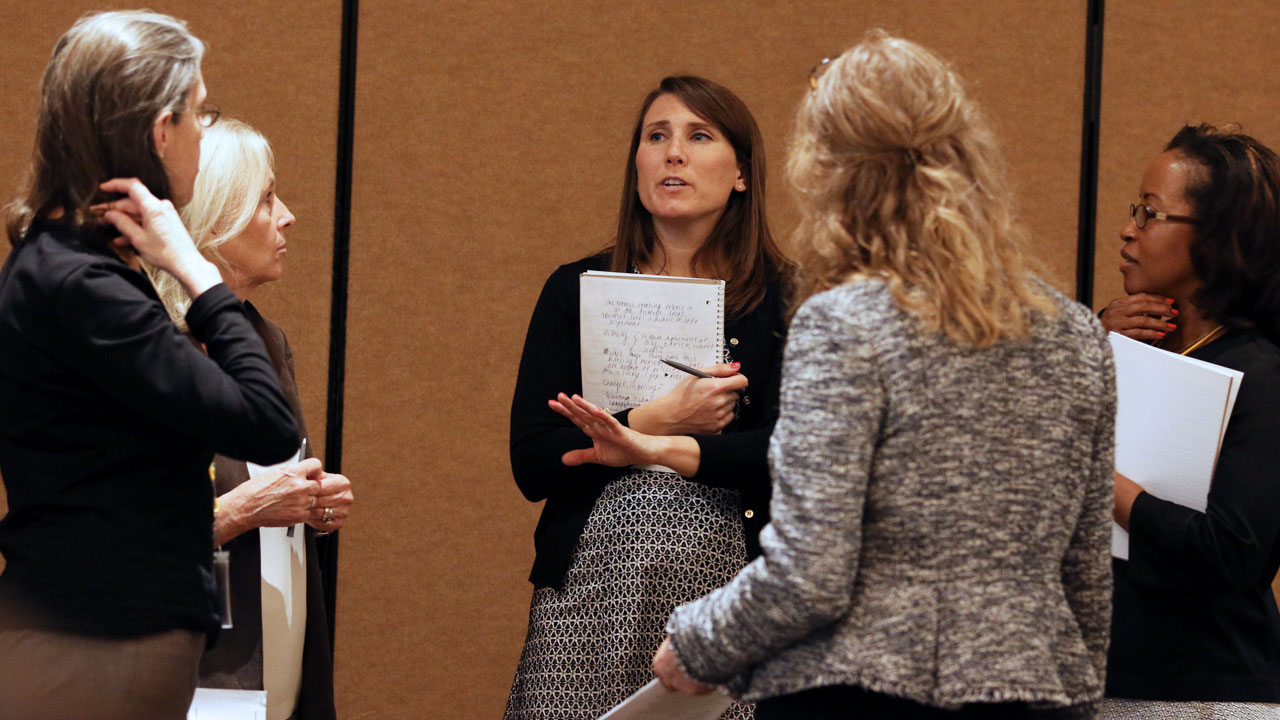07 Jan Program builds community among early career researchers

Pictured above: MDRC’s Meghan McCormick, Network Early Career Enhancement program participant, talks to colleagues with the Early Learning Network and the Institute of Education Sciences.
Scientists at all career levels are needed to solve one of our most pressing national challenges: ensuring that all children are given opportunities to be successful, both in school and in life.
New researchers in early childhood education, in particular, are in a position to significantly influence future generations of children in classrooms and communities across the U.S. They are the thought leaders of tomorrow who will inform the field’s policies and practices for decades to come.
Since launching in 2017, the Early Learning Network’s Early Career Enhancement program has fostered a community of emerging scholars involved in its various research studies. NECE provides participants with opportunities for individualized training, professional development and mentored support.
Led by mentor Susan Sheridan, principal investigator for the Early Learning Network Lead at the University of Nebraska-Lincoln, the program brings together nearly a dozen young researchers from around the U.S. – virtually – to discuss topics such as:
- Building research collaboration and partnerships
- Navigating institutional roles and responsibilities
- Publishing and dissemination
- Writing research grants
- Exploring career options
- Creating work-life balance
NECE participants choose the topics that are most relevant to them, and the network’s principal investigators help facilitate the bimonthly conversations.
“Our discussions have helped me to feel supported from colleagues across the country, and to know that I am not alone in my efforts to conduct impactful research,” said participant Mary Bratsch-Hines, University of North Carolina at Chapel Hill. “As the group continues to meet, I think we will find more opportunities to collaborate on projects and share our different areas of expertise, which will allow us to continue to learn from and support each other.”
In addition to providing young researchers with valuable information, NECE offers them an outlet to share ideas and concerns as they navigate the demanding and rewarding field of education research.
“I look forward to our meetings – they’re productive and have allowed me to make new connections,” said participant Renata Gomes, University of Nebraska-Lincoln. “The opportunity to engage with Early Learning Network colleagues and nationwide research, papers and presentations has strengthened my skills.”
Recently, a collaborative project grew out of the NECE group that focused on measuring early learning among male kindergarteners with and without autism. Participants Nicole Sparapani, Natalie Koziol and Bonnie Mackintosh co-presented their project at the Society for Research in Child Development’s DEVSEC: Conference on the Use of Secondary and Open Source Data in Developmental Science” in October 2018.
“Seeing this kind of cross-site collaboration among the group is exciting as the Early Learning Network has really prioritized supporting young researchers and helping them find ways to work together to be successful,” Sheridan said.
The group will continue to meet over the next two years, and is currently identifying future discussion topics, such as cultivating research collaboration/joint funding and publication opportunities, planning for promotion/tenure, networking and providing leadership to students and staff.
Find out more about the NECE program and its participants.

